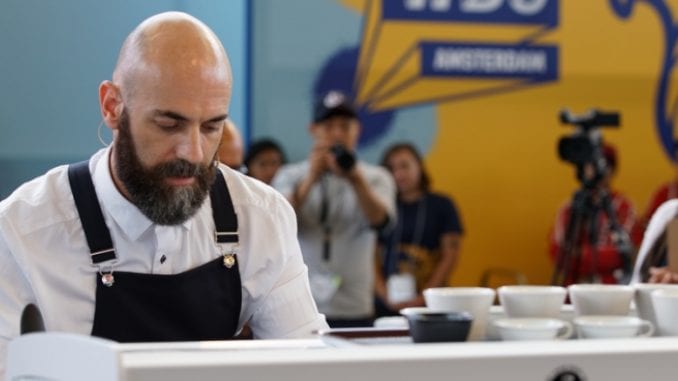
John Gordon is a multi-national barista champion; here he explains how his extensive coffee career has prepared him for competition.
BY ASHLEY RODRIGUEZ
BARISTA MAGAZINE ONLINE
Photos courtesy of World Coffee Events
Not a lot of barista competitors have won their national championships more than once. There are even fewer competitors who have won national titles from two different countries. John Gordon, who is originally from Australia, is the current barista champion of New Zealand, but has been the United Kingdom’s barista champion multiple times. Here, the 2018 WBC sixth-place finisher details his career in coffee and competition, talks about innovative projects, and provides an outlook for the future of coffee.
Ashley Rodriguez: Could you tell us a little more about your coffee background. How did you get into coffee?
John Gordon: I kind of stumbled into coffee; I have been in the hospitality industry for over 20 years now, and I was looking for a new direction. When I was living in Melbourne around 14-15 years ago, I was fortunate to be able to go to some small coffee tastings and was amazed by how different coffee could be. I eventually was offered a barista position at a small café/roastery in South Melbourne and immediately became obsessed.
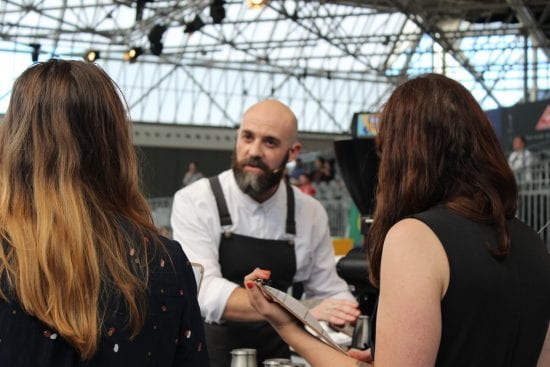
After working in Melbourne for a couple of years I then moved to London, where my sister had been living for some time. I worked for an events company that took coffee bars all around the U.K. and Europe for the next couple of years, and in that time started developing an interest in coffee equipment too.
2009 was my first year competing in the UK barista competition (UKBC), and although I didn’t do too well, I made the semifinals but finished in 14th place. It was a big challenge for me because I was and still do get extremely nervous. But later that year I also entered the U.K. Latte Art Competition and won. I managed to make my way into the finals at the World Latte Art Championships in Cologne, Germany, and took sixth place.
After this I was fortunate to then start working for the newly formed Square Mile Coffee Roasters and very quickly moved further into the technical side of coffee equipment. That’s also where I started roasting.
In 2010 I pushed hard in competition again and won the UKBC and then narrowly missed out on a semifinal position at the 2010 WBC in London by 1 point. I decided to keep going, and I won the 2011 UKBC and that year exceeded my goals and made the WBC finals in Colombia.
In 2012 I started working with Sanremo Coffee Machines as part of the their R&D team while still at Square Mile and really started pushing my boundaries of equipment R&D.
2013 I came back to competition and once again won the UKBC, and this time WBC was in my hometown of Melbourne. I made the semifinals; however, after a small mistake in the semis, my WBC journey finished there.
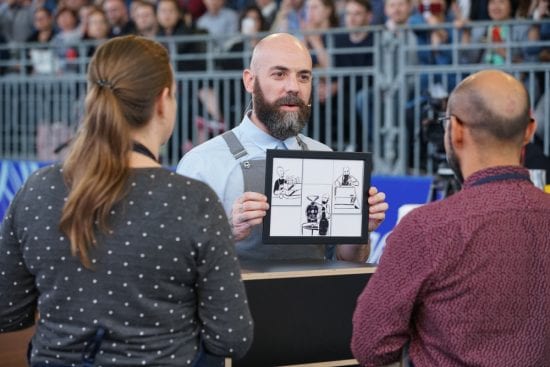
AR: What do you currently do?
JG: Now I own my own company, Gorilla Gear. I focus on designing equipment and consulting, and I have a range of aftermarket grinder burrs with an extensive new range coming out over the next month. We just launched a new Direct Wholesale Partnership & Development Program for my products with the goal of creating long-term direct relationships with coffee roasters to provide them with high-quality burrs and a sustainable and economical goal in mind.
AR: Why did you decide to compete in 2018? What did it feel like representing New Zealand?
JG: I’ve always competed to challenge myself, push myself to learn something new, but this year was very different. I felt I had something more to say, something more than my own exploration of coffee.
Honestly it was a little weird this year being called out as representing New Zealand. I’m honored to be able to represent New Zealand and always felt so lucky to be able to step up on the world stage. Funny thing is I can now compete in four different countries with multiple passports and citizenships.
AR: Can you tell us about the coffee you used?
JG: The coffee I used was sourced by Project Origin as part of their new CM (carbonic maceration) selection range. The coffee I used for the espresso and milk course was the result of PO’s first experiments done with a new processing station in Ethiopia. When I decided to put the competition boots back, on I had a very clear goal in mind, and after speaking with Sasa Sestic about it and the projects they were about to start, it was really an easy decision to go for these coffees.
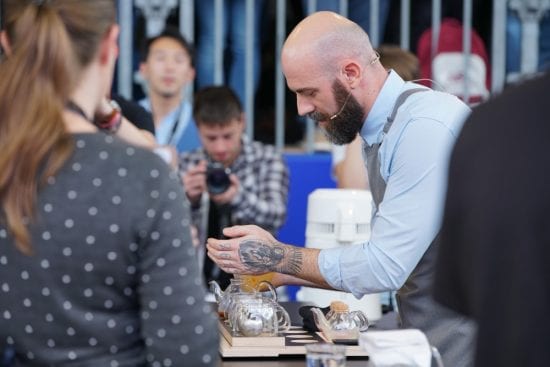
The espresso and milk course were processed using PO’s new Whole Cherry Carbonic Maceration, and my signature drink coffee was the same coffee but a traditional washed process.
In the finals, the recipe for each course was:
Espresso – 20g dose – 45g beverage mass – 18-20 seconds
Milk – 22g dose – 36g beverage mass – 24-26 seconds
Signature Drink – 20g dose – 50g beverage mass – 16 seconds
The signature drink was to show how the CM process can take coffee to a new level of flavor complexity. I re-created a mix of both the espresso and milk course coffee characteristics using distinct identities found in each coffee; building it was relatively simple, but the tasting progression as it cooled was amazing and fun to see a huge transformation into something exciting. On the finals day it was like raspberry lemonade.
AR: What expectations did you have going to worlds? What did you hope to gain from this experience?
JG: I never try to have too many expectations aside from doing the best I can, I do set myself personal goals and one was to make the finals once again.
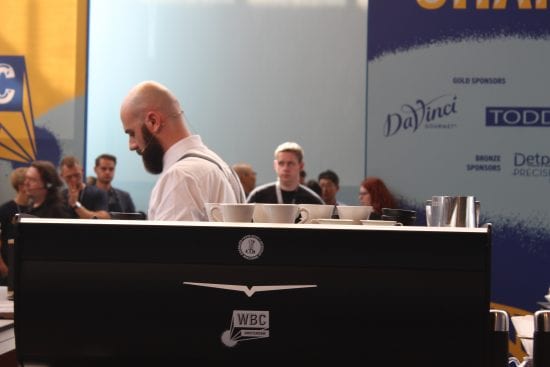
I hope out of all of this that some part of my message will hit the right people and start to make some changes globally. I hope it starts to make a push toward balancing out the industry’s chain and bring more value and strength to the beginning [of the supply chain], and push more sustainable resources and practices throughout our industry.
AR: You’ve competed in the past—how has this time been different from previous competitions? Will you do this again?
JG: After having some time off, it really did feel all new again and refreshing, but at the same time challenging. I definitely have the bug again but time will tell if I will keep going.
AR: Tell us a little about the coffee scene in New Zealand. How have you seen it change and what do you hope to see in the future?
JG: What I think is the most stand out change in NZ is the types and quality of coffee making its way over the bar and consumers slowly recognizing the difference. Access to great green is becoming a little easier although still expensive to ship here.
I’d like to see more challenging coffee experiences in NZ, better communication and customer service, and the standard café style cut and paste to be broken up, more creativity and efficiency.
AR: Is there anything you want people to know about you?
JG: I think the biggest thing I’d like to put out is that it’s really time we all started working as a team to make things better. Collaborations and sharing is the future of the industry becoming sustainable. Be kind to each other, be respectful, and treat others the way you wish to be treated. If we stand side by side we can all move forward much easier.

